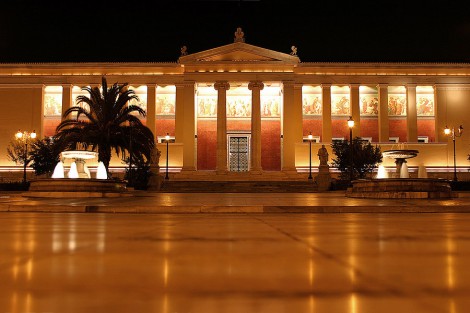Specialisation 1 Specialisation 2 Specialisation 3 Specialisation 4
Law, Science and Technology
In this specialization the aim will be to show the interrelations and the co-production of law with techno-sciences. Following the approach of the co-production idiom as suggested, developed and explored by Sheila Jasanoff (2006) the specialization shed light to the institutions and the actors that shape and construct innovation laws, regulatory science and develop civic epistemologies. The emphasis will be on how national and transnational institutions that produce science and technology policy think and act and their way in taking decisions and trying to implement them. State and Governmental Departments, Parliamentary Committees, City Councils Committees as well as Law Courts will be studied as loci where science and technology interact with the law and where techno-scientific and legal cultures are informed and co-constructed.
The emergence of innovation laws, intellectual property legislation, regulatory sciences and epistemologies in historical and sociological perspective will be studied on the following themes: Biotechnology, Medical Technologies, Environment & Energy, ICT and Emerging Technologies. Comparisons will be conducted both between sectors as well as between countries and regions. Particular concern will be given to show the role, function and agency of transnational institutions and actors.
Core Readings
Arapostathis Stathis and Graeme Gooday, Patently Contestable: Electrical Technologies and Inventor Identities on Trial in Britain (MIT Press, 2013).
Arapostathis Stathis and Graham Dutfield (eds.), Knowledge Management and Intellectual Property: Concepts, Actors and Practices from the Past to the Present (Edward Elgar, 2013)
Biagioli Mario, Martha Woodmansee and Peter Jaszi, Making and Unmaking Intellectual Property, edited volume, (Chicago: University of Chicago Press, 2011).
Biagioli Mario and Jessica Riskin, Nature Engaged, edited volume (New York: Palgrave-MacMillan Publishers, 2012).
Biagioli Mario, Galileo’s Instruments of Credit: Telescopes, Images, Secrecy, (Chicago: University of Chicago Press, 2006)
Biagioli Mario and Peter Galison, Scientific Authorship: Credit and Intellectual Property in Science, edited volume, (New York: Routledge, 2003).
Cloatre, Emilie and Martyn Pickersgill (eds), Knowledge, Technology and Law (Law, Science and Society) Routledge, 2014
Hilgartner, Stephen, Selective Flows of Knowledge in Technoscientific Interaction: Information Control in Genome Research,” The British Journal for History of Science, 2012.
Hilgartner, Stephen, “Intellectual Property and the Politics of Emerging Technology: Inventors, Citizens, and Powers to Shape the Future.” Chicago-Kent Law Review (2009), Vol. 84, No. 1, pp. 197-224.
Hilgartner, Stephen, Clark Miller, and Rob Hagendijk, eds., Science & Democracy: Making Knowledge and Making Power in the Biosciences and Beyond, Routledge (2015).
Jasanoff, Sheila, Science at the Bar, Harvard University Press, 1995.
Jasanoff, Sheila, The Fifth Branch: Science Advisors as Policymakers, Harvard University Press, 1990.
Jasanoff, Sheila, “Science and the Statistical Victim: Modernizing Knowledge in Breast Implant Litigation,” Social Studies of Science, Vol. 32, No. 1 (Feb., 2002), pp. 37-69.
Jasanoff, Sheila, ‘Law’s Knowledge: Science for Justice in Legal Settings’, American Journal of Public Health | Supplement 1, 2005, Vol 95, No. S1
Jasanoff, Sheila (ed.), Reframing Rights: Bioconstitutionalism in the Genetic Age Cambridge MA: MIT Press, 2011
Jasanoff, Sheila (ed.), States of Knowledge: The Co-production of Science and the Social Order (Routledge, 2006)
Sample of topics for theses
- Theories about the law-technosciences relationship
- Theories and case studies on the relationship between technology, innovation and law, gender, class and democracy
- Co-construction of law and emerging technologies
- North/South division
- Authorship & invention in science and technology
- Invention, Secrecy, IPR and Innovation
- Innovation, IPR and Academic Research
- ICT, Law, Control Society and Policing
- Law, expertise and techno-sciences
- Public rhetoric and image of the technology-law relationship
- Medical/Bio-medical Technologies, Patients and Regulations
- Agriculture and IPR
- Agriculture, Techno-sciences and Law
- Law and Toxicity
- Risk, Vulnerabilities, Epistemic Governance and Public Policies
- Institutions, Regulations and Techno-scientific public policies
- Courts and the making of techno-sciences
- Environment, Law and Techno-sciences
- Ethics, Law and Techno-sciences
- Classification, Arbitration, Evaluation, Regulations of Technologies and Infrastructures
Language of Instruction: English
Minimum and Maximum Number of Students: 1-5
Schedule of Introductory Course
6 three-hour meetings at the beginning of ESST’s second semester
Specialization Coordinator
Stathis Arapostathis
